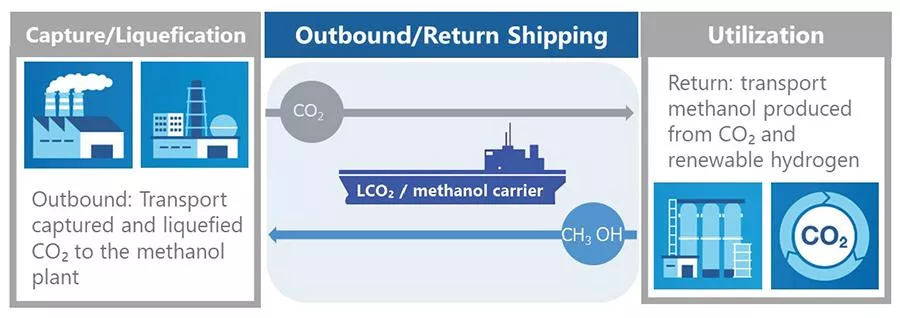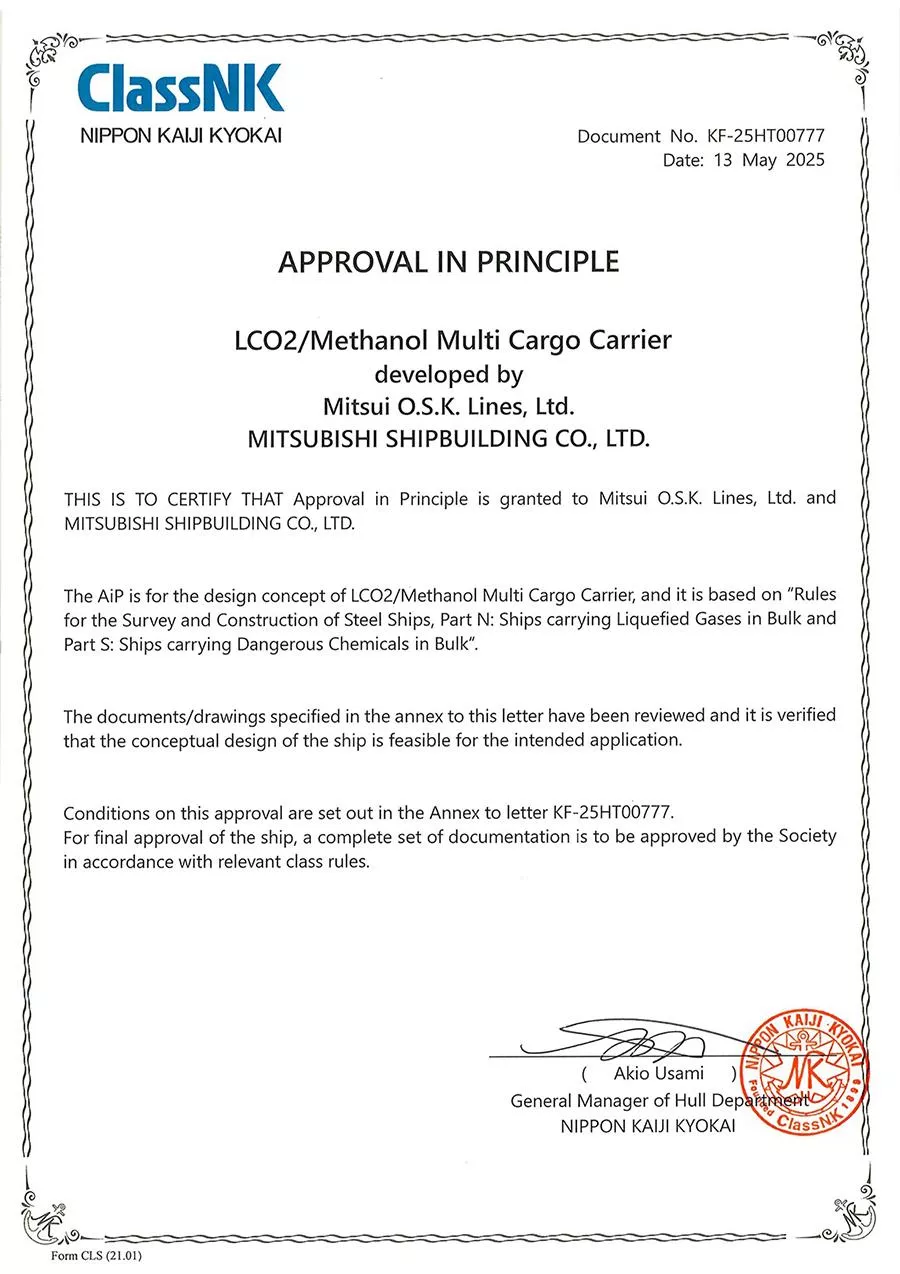
Approval in Principle (AiP) for World's First LCO₂ / Methanol Carrier
Published by Todd Bush on June 30, 2025
Tokyo, June 30, 2025 - Mitsubishi Shipbuilding Co., Ltd., a part of Mitsubishi Heavy Industries (MHI) Group, and Mitsui O.S.K. Lines, Ltd. (MOL) have acquired Approval in Principle (AiP)(Note1) from Nippon Kaiji Kyokai (ClassNK) for their jointly developed liquefied CO2 (LCO2) / methanol carrier. AiP acquisition for this type of carrier marks a world's first(Note2).
>> In Other News: KAIST AI Advances CO₂-Selective Material Discovery

Conceptual diagram of LCO2 / methanol carrier operation
Technologies for converting CO2 into fuel or chemical products are attracting attention as a means of utilizing CO2 in CCUS (Carbon dioxide Capture, Utilization and Storage). One such approach is the ongoing study toward realizing a supply chain for producing synthetic methanol(Note3) from captured CO2. Synthetic methanol is expected to serve as one of the marine fuels that will contribute to decarbonization in the maritime shipping industry.
The vessel for which Mitsubishi Shipbuilding and MOL acquired AiP is based on a low-pressure LCO2 carrier. It aims to transport CO2, which serves as raw material, on outward voyages and synthetic methanol on return voyages. Use of dedicated vessels for CO2 or methanol results in empty-cargo operation on half of their trips. If dual transport of CO2 and methanol is achieved, empty-cargo trips can be eliminated, thereby improving overall transport efficiency. Mitsubishi Shipbuilding and MOL will move forward with the development of the LCO2 / methanol carrier, building on the findings and technical challenges identified during the concept study. The goal is to achieve commercialization of the LCO2 / methanol carrier through collaboration with relevant companies in the supply chain and other partners.
MHI Group is currently pursuing strategic measures to strengthen its business for the energy transition. In conjunction with this initiative, Mitsubishi Shipbuilding is making efforts to contribute to the advancement of the maritime industries in Japan and around the world by utilizing its shipbuilding-based marine engineering technologies in addition to conventional shipbuilding. The development of LCO2 / methanol carrier is one example of these efforts. Collaboration with MOL also demonstrates MHI Group's commitment to partnerships. Moving forward, Mitsubishi Shipbuilding will continue to build strategic global partnerships both to incorporate external expertise and actively advance the development of a CCUS value chain. Through these efforts, the company aims to provide its technologies, products and services to ever more customers.
The MOL Group is currently working to build supply chains for synthetic fuel/methanol and CO2 through initiatives such as its investment in HIF Global LLC(Note4), a U.S.-based company that develops, produces and transports synthetic fuel/methanol across North and South America and Australia. LCO2 / methanol carrier is expected to enhance the overall economic viability of such supply chains and contribute significantly to their realization. In line with the "MOL Group Environmental Vision 2.2," MOL is targeting net-zero emissions Groupwide by 2050. By further accelerating initiatives to transport CO2 as well as to develop and supply synthetic methanol, MOL aims to contribute to realization of a low-carbon or decarbonized society.

Note 1 Approval in Principle (AiP) indicates that a certification body has reviewed the basic design of the subject equipment and confirmed that it meets technical requirements and relevant safety standards. In this case, the inspection was conducted based on the IGC Code (International Code for the Construction and Equipment of Ships Carrying Liquefied Gases in Bulk), IBC Code (International Code for the Construction and Equipment of Ships Carrying Dangerous Chemicals in Bulk), and ClassNK Classification Rules applicable to ships transporting liquefied gases and dangerous chemicals in bulk.
Note 2 Based on surveys performed by Mitsubishi Shipbuilding and MOL.
Note 3 Synthetic methanol (e-methanol) is a synthetic fuel made from CO2 and hydrogen generated from renewable energy.
Note 4 For details, see MOL's press release issued September 20, 2024: https://www.mol.co.jp/en/pr/2024/24108.html
Subscribe to the newsletter
Daily decarbonization data and news delivered to your inbox
Follow the money flow of climate, technology, and energy investments to uncover new opportunities and jobs.
Latest issues
-
$47M Just Poured Into This SAF Producer
Inside This Issue 💰 LanzaJet Announces $47M in New Capital and First Close of Equity Round at $650M Pre-Money Valuation 🚢 Maersk's Ethanol Bet Could Reshape U.S. Fuel Markets 🪨 Canada Nickel and t...
-
Kita's $29M Bet Signals Carbon Insurance Is Here
Inside This Issue 🛡️ Kita's $29M Bet Signals Carbon Insurance Is Here 🏗️ CCI BioEnergy Selects Arcadis As Design-Engineer Partner Under Master Service Agreement 🤝 Tapestry and Climeworks Announce ...
-
Cummins Quit Electrolyzers. Electric Hydrogen Didn't.
Inside This Issue ⚡ Cummins Quit Electrolyzers. Electric Hydrogen Didn't. 🧪 New Electrified Method Captures Carbon Dioxide From Air 🌾 Iowa Could Be on the Cusp of a Hydrogen Rush; Lawmakers Weigh ...
Company Announcements
-
HOUSTON and OXFORD, England/PRNewswire/ -- Velocys today announced that it has implemented manufacturing and delivery efficiencies that reduce total investment cost for its microFTL™ technology by ...
-
Agreement signals ongoing growth of Sustainable Aviation Fuel market GREAT FALLS, Mont. and BOSTON, Feb. 19, 2026 /PRNewswire/ -- Montana Renewables, LLC (MRL) and World Energy Clean Fuels LLC (Wo...
-
BASF Launches Circalo: Low Carbon Intensity Crops To Help Ethanol Producers Capture Value Under 45Z
RESEARCH TRIANGLE PARK, NC, February 19, 2026 – BASF has introduced Circalo™: Low Carbon Intensity Crops, a comprehensive, unified platform designed to connect farmers, agronomists and ethanol prod...
-
International Airlines Group (IAG), Shell, Groupe ADP, LanzaTech, and Mitsui make additional investments to support LanzaJet's growth and commercial deployment of its proprietary Alcohol-to-Jet (AT...